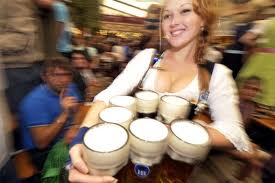What Happened Last Night? Alcohol Induced Blackouts.
By Jenny Hunt
February 24, 2012
Many of us have asked this question after a night of drinking. Binge drinking alcohol can cause memory loss similar to amnesia. These periods of alcohol-related amnesia are generally referred to as blackouts. So what are blackouts, exactly? What causes you to blackout?
Most people experience one of two types of blackouts-en bloc blackouts and fragmentary blackouts. En bloc blackouts happen when you are unable to recall anything from the blackout period, even when your memory is prompted. Fragmentary blackouts are classified as being able to remember certain things during the blackout period, but having gaps in your memory. Fragmentary blackouts seem to occur with lower blood alcohol content then en bloc blackouts. Sometimes, when prompted, a person can remember certain things that happened during a fragmentary blackout.
The important thing to remember about blackouts is that they are not the same as “passing out” or losing consciousness. Blackouts are periods of time when the drinker is completely conscious, having conversations and performing sometimes amazing feats, but later they have absolutely no memory of the events that transpired. Total amount of alcohol ingested does not seem to be the determining factor when people blackout. Whether or not a person will blackout seems to depend on how quickly they consume the alcohol. Surveys suggest that a person can drink the same amount or more alcohol as he or she did when the blackout occurred and not experience memory loss, provided they drink the alcohol over a longer period of time.
Enough alcohol will prevent the brain from recording new memories. These periods of amnesia are primarily “anterograde,” meaning that alcohol impairs the ability to form new memories while the person is intoxicated, but does not typically erase memories formed before intoxication. During the blackout, the brain is not recording anything going on, which is why you are unable to recall it later. Alcohol affects the hippocampus area of the brain, which is involved in memory storage.
Though repeated episodes of blacking out will lead to permanent changes in the brain, blackouts are more psychosocially damaging than physically damaging. Many people report engaging in high-risk behavior during a blackout. They drive while intoxicated, get into fights, or engage in unprotected sex. During a blackout, normal restraint of emotions, impulses, and desires is impaired and that may result in enormous harm to self and others. Blackouts inhibit your ability to control your impulses. This can be very dangerous.
When alcohol is mixed with other drugs, especially drugs classified as benzodiazepines (i.e. Xanax, Valium, Rohypnol), blackouts are even more common. Benzodiazepines act on GABA receptors in the brain, magnifying the effect of alcohol. The risk for blacking out is compounded when alcohol is mixed with these drugs, as is the risk of overdose and death. The combination of two potent central nervous system depressants can produce serious side effects on the cardiovascular and respiratory systems. This puts you at risk for respiratory depression. This side effect is especially dangerous for someone knocked unconscious by the sedative cocktail, as it can lead to respiratory failure.


